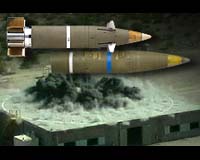| . |  |
. |
Jakarta (UPI) Apr 28, 2011 Indonesia has test fired a Russian-made Yakhont anti-ship missile during naval exercises in the Indian Ocean, Indonesia's Antara news agency said. The missile, with a NATO code name SS-N-26, was launched from the Van Speijk Class frigate Oswald Siahaan and took 6 minutes to cover 155 miles and destroy a target vessel. The successful launch was the first test by Indonesia's navy of its Yakhont missiles, and a long time coming, a senior officer said. "The target ship was hit and sank," navy spokesman Rear Adm. Iskandar Sitompul said. "We bought these missiles a long time ago and have finally tested them." Russian observers were present during the firing and drills for preparation for firing. The Yakhont has a maximum range of around 190 miles when cruising at high altitude. But it will travel at cruise-missile levels -- 15-50 feet -- during the final minutes of its flight before hitting its target, Antara reported. Yakhont missiles -- the export version of the P-800 Oniks missile produced for Russia's military -- are made by NPO Mashinostroyeniya, a rocket design bureau based in Reutov, Russia. During the cold war NPO produced several major weapons systems, including the SS-19 Intercontinental ballistic missile. India is NPO's second largest customer after Russia for several missiles including the Yakhont. NPO technicians also helped develop India's indigenous missile the BrahMos. Indonesia bought an undisclosed number of the Yakhont missiles for $1.2 million each in 2007 to deploy alongside the navy's Harpoon missiles purchased around the same time. In December 2005, the Indonesian navy announced plans to buy Harpoon missiles from the United States, following the U.S. decision the month before to lift its military embargo on Indonesia. "The number of the missiles and when it will be bought would still have to be discussed further," Indonesian navy chief of staff, Adm. Slamet Soebijanto told reporters at the time. Similarly to the situation with the Yakhont missiles, military budget issues delayed testing and deployment of missiles purchased by Indonesia's navy. When Indonesia announced in 2005 its intention to purchase Harpoon missiles, budget and planning assistant to the navy chief of staff, Maj. Gen. Yussuf Solichien said procurement had been a long process. "These (Harpoon) missiles are as powerful as Exocet MM 38 missiles, which could hit targets (50-62 miles) away. We have the launchers but have not been using them in the last five years." The all-weather, over-the-horizon, anti-ship missile Harpoon was developed and later manufactured by McDonnell Douglas, now Boeing Defense, Space and Security, beginning in the early 1970s. In 2004, Boeing delivered the 7,000th Harpoon unit since the weapon's introduction in 1977. Further development of the Harpoon led to the land-strike weapon, the Standoff Land Attack Missile.
Share This Article With Planet Earth
Related Links Learn about missile defense at SpaceWar.com All about missiles at SpaceWar.com
 U.S. Army Awards Raytheon $173 Million Contract for Excalibur
U.S. Army Awards Raytheon $173 Million Contract for ExcaliburTucson AZ (SPX) Apr 25, 2011 Raytheon has received a $173 million U.S. Army fiscal year 2010 contract for the production of Excalibur precision-guided projectile rounds for in-theater use. This contract marks the beginning of full rate production for Excalibur Ia-2. Successfully fielded in 2007, Excalibur is a 155 mm precision-guided artillery round with extended range that is currently in use with the U.S. Army and M ... read more |
|
| The content herein, unless otherwise known to be public domain, are Copyright 1995-2010 - SpaceDaily. AFP and UPI Wire Stories are copyright Agence France-Presse and United Press International. ESA Portal Reports are copyright European Space Agency. All NASA sourced material is public domain. Additional copyrights may apply in whole or part to other bona fide parties. Advertising does not imply endorsement,agreement or approval of any opinions, statements or information provided by SpaceDaily on any Web page published or hosted by SpaceDaily. Privacy Statement |